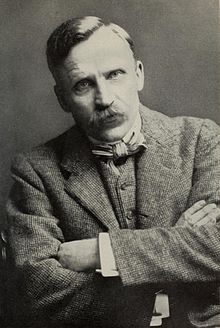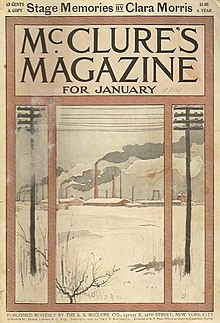| S. S. McClure | |
|---|---|
 S. S. McClure (c. 1903) S. S. McClure (c. 1903) | |
| Born | Samuel Sidney McClure (1857-02-17)February 17, 1857 County Antrim, Ireland (now Northern Ireland) |
| Died | March 21, 1949(1949-03-21) (aged 92) New York City |
| Education | Knox College |
| Occupation(s) | Investigative journalist, publisher, editor |
| Spouse | Harriet Hurd (1883-1929; her death) |
Samuel Sidney McClure (February 17, 1857 – March 21, 1949) was an American publisher who became known as a key figure in investigative, or muckraking, journalism. He co-founded and ran McClure's Magazine from 1893 to 1911, which ran numerous exposées of wrongdoing in business and politics, such as those written by Ida Tarbell, Ray Stannard Baker, and Lincoln Steffens. The magazine ran fiction and nonfiction by the leading writers of the day, including Sarah Orne Jewett, Mark Twain, William Dean Howells, Joel Chandler Harris, Jack London, Stephen Crane, William Allen White and Willa Cather.
Biography
He was born to an Ulster Scots family in County Antrim in what is now Northern Ireland, and emigrated with his widowed mother to Indiana when he was nine years old. He grew up in near poverty on a farm and graduated from Valparaiso High School in 1875. He worked his way through Knox College, where he co-founded its student newspaper, and later moved to New York City.
In 1884, he established the McClure Syndicate, the first U.S. newspaper syndicate, and published in Sunday newspapers, containing serials of books, recipes and reviews.

He founded McClure's Magazine in 1893 and ran it successfully until 1911 when poor health and financial reorganization forced him out (and many of his writers had defected to form their own magazine). McClure's Magazine published influential pieces by respected journalists and authors including Jack London, Ida Tarbell, Upton Sinclair, Burton J. Hendrick, Rudyard Kipling, Sir Arthur Conan Doyle, Robert Louis Stevenson, Willa Cather, and Lincoln Steffens. Through his magazine, he introduced Dr. Maria Montessori's new teaching methods to North America in 1911.
McClure was a business partner of Frank Nelson Doubleday in Doubleday & McClure, ancestor to today's Doubleday imprint. After McClure left Doubleday, he established the publisher McClure, Phillips and Company with John Sanborn Phillips. Phillips left to purchase The American Magazine in 1906 and McClure sold his book publishing operations to Doubleday, Page in 1908. After he was ousted in 1911, McClure's Magazine serialized his autobiography, ghost-written by one of the magazine's editors, Willa Cather.
McClure created a whole new form of writing for his journalists that we still use today. Instead of demanding that his writers give him articles for his paper immediately, he would give them all the time they needed to do extensive research on their topics.
Rudyard Kipling was one writer who rejected McClure's offer of a long-term contract, quoting as justification Ecclesiasticus (Chapt. 33, verse 21): "As long as thou livest and hast breath in thee, give not thyself over to any". Kipling was also present when McClure began to contemplate the launch of a new literary magazine. He recalled in his autobiography:
He entered , alight with the notion for a new Magazine to be called 'McClure's.' I think the talk lasted some twelve—or it may have been seventeen—hours, before the notion was fully hatched out.
He died in New York City in 1949, at the age of 92. He is buried next to his wife Harriet at Hope Cemetery in Galesburg, Illinois.
Legacy
According to his biographer Peter Lyon, McClure was, "one of the greatest instinctive editors ever to function in the US, and one of the most wretched businessmen." Lyon suggests that he had a manic-depressive personality, combining enthusiasm, tenacity, and a remarkable talent for predicting public responses. He favored Western writers, and especially muckraking articles that made his magazine famous. On the other hand, he was unstable with a hair-trigger impatience that alienated many staffers. Always in the red, he sold first his book publishing house, then his nationwide newspaper syndicate, and finally his own magazine.
Notes
- Charles Fanning, The Exiles of Erin: Nineteenth-Century Irish-American Fiction (2nd ed. Chester Springs: Dufour Editions, 1997), 13.
- ^ McCully, Emily Arnold (2014). Ida M. Tarbell : the woman who challenged big business-- and won!. Boston: Clarion Books. ISBN 9780547290928. OCLC 816499010.
- Peter Lyon, Success story: The life and times of SS McClure(1967).
- Batra, Nandita; Dzwonkoski, David (1986). "McClure, Phillips and Company". In Peter Dzwonkoski (ed.). American literary publishing houses, 1900-1980. Trade and paperback. Dictionary of literary biography. Detroit, Mich: Gale Research Co. pp. 227–228. ISBN 978-0-8103-1724-6.
- "A Great Combined Holiday List", Chicago Daily Tribune, December 18, 1908, page 9.
This panel advertisement by Doubleday, Page displays among the book listings: "McClure's Books including the works of more than 200 well-known authors Now published by Doubleday, Page & Company". A different advertisement in The New York Times next day, p. BR789, features the Children's Crimson Classics series edited by Kate Douglas Wiggin and Nora Archibald Smith, without change in series name or prices of previous volumes.
Promotional items in October 1907 newspapers present "The McClure Company" as successor to "McClure, Phillips & Co." - "S.S. McClure, My Autobiography". Willa Cather Archive. Retrieved November 19, 2018.
- ^ Rudyard Kipling, Something of Myself: for my friends known and unknown, London: MacMillan and Co., 1951 (first published 1937). p. 125
- Peter Lyon, "McClure, Samuel Sidney" in John A. Garraty, ed., Encyclopedia of American Biography (1974), pp 706-707.
Further reading
- Baxter, Katherine Isobel. "'He's lost more money on Joseph Conrad than any editor alive!': Conrad and McClure's Magazine." Conradiana 41.2 (2009): 114–131.
- Gorton, Stephanie. Citizen Reporters: S. S. McClure, Ida Tarbell, and the Magazine that Rewrote America. New York: Ecco/HarperCollins, 2020.
- Lyon, Peter (1963). Success Story: The Life and Times of S. S. McClure. New York: Charles Scribner's Sons.
- McClure, Samuel (1914). My Autobiography. New York: Frederick A. Stokes Co – via Willa Cather Archive. (Ghostwritten by Willa Cather), a primary source
- McCully, Emily Arnold (2014). Ida M. Tarbell The Woman Who Challenged Big Business and Won. New York: Clarion Books.
- Goodwin, Doris Kearns (2013). The Bully Pulpit: Theodore Roosevelt, William Howard Taft, and the Golden Age of Journalism. New York: Simon & Schuster.
- Urgo, Joseph R. "Willa Cather's Political Apprenticeship at McClure's Magazine." in Willa Cather’s New York: New Essays on Cather in the City (2000): 60–74.
External links
- McClure Publishing Company Archives - Special Collections, University of Delaware Library
- S. S. McClure at Library of Congress, with 8 library catalog records